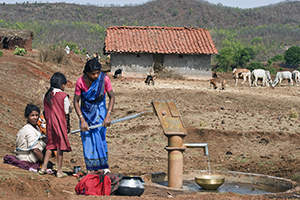
The “out of sight, out of mind” attitude is proving to be critical for the slow progress toward target 6.2 of the Sustainable Development Goals (SDGs), focusing on global, safely managed sanitation. There is a general lack of awareness among users on the whereabouts of their poop [1], and the discussion on wastewater management is scarce and still a taboo topic in many parts of the world, leading to a lack of safely managed sanitation services. Besides the lack of demand hampering progress, the supply side of wastewater management is equally grim.
The slow rate of supply can be attributed to the fact that governments across developing Asia have been largely focused on networked sanitation. The cost and time intensive nature of networked options has led to unmet demands and the generation of untreated wastewater, leading to health, environmental, and economic losses as 50% of the global population has been relying on crude on-site systems.
To find solutions for accelerating the progress on the SDGs for sanitation, the Asian Development Bank Institute (ADBI), in partnership with the Bill and Melinda Gates Foundation, hosted the Development Partner Roundtable and Policy Dialogue Session on Sustainable Sanitation in Asia [2] during 20–22 September 2018 in Tokyo. The objective of the event was to deliberate ideas on scaling up and accelerating the city-wide inclusive sanitation (CWIS) [3] and fecal sludge management (FSM) [4] approaches.
More than 28 experts from various multilateral and bilateral development agencies and other development partners brainstormed at the first-of-its-kind development partner roundtable. The brainstorming was systematized through so-called “human-centered innovation”, a bottom-up approach facilitated by i.school [5]. The learnings from the roundtable were then discussed with government officials from 9 countries and over 25 other stakeholders during the policy-dialogue session, leading to a consensus on championing “sanitation for all from now”.
The roundtable started with development partners showcasing their experiences and learnings on the role of leadership, institutional arrangements, and financing mechanisms for sustainable sanitation. Donor partners pressed on prioritizing the whole sanitation service chain [6] along with the integration of sanitation in overall water management. However, the experiences of large-scale FSM in Asia [7] and small-town projects in Nepal [8] highlighted a range of challenges. The meeting presented innovative financing [9] and the capacity building of both governments [10] and private operators [11] through the piloting of new technologies [12] and policies [13] for encouraging a multi-pronged approach [14].
Group exercises began by identifying the obstacles to the efficacy of existing scenarios, leading to participants ideating innovative solutions for overcoming the roadblocks, which were then presented by the respective groups.
Several ideas emphasized a global awareness movement to boost demand, prioritize access to safely managed sanitation, and undertake efficient operations and maintenance practices. The ideas stressed drawing lessons from the spillover effects of an effectively managed FSM service [15] to create value for users and increase their willingness to pay. Other ideas promoted the benchmarking of cities’ performance for healthy competition [16]. The use of GPS-enabled management systems to optimize the desludging process and mobile apps to enable smooth operator payments, etc. were also discussed. Another idea stressed on developing a certification framework for the employment of new technology as well as for certified training programs [17] for all involved in the FSM service chain.
The findings of the roundtable were then discussed with government officials from Bhutan [18], Cambodia [19], the Kyrgyz Republic, Malaysia [20], Myanmar [21], Nepal [22], Tajikistan, Sri Lanka [23], and Timor-Leste [24] at the Policy Dialogue Session, where they highlighted the ongoing activities, institutional arrangements, and challenges in their respective countries through an open discussion.
The experience of these countries reaffirmed the marginalized state of the sanitation sector, which heavily focuses on sewered sanitation. Interestingly, the case of Malaysia highlighted the unsustainability of sewered sanitation, caused by its heavy capital and operational burden, reaffirming the importance of the CWIS and FSM approaches. Then, an analysis of large-scale FSM experiences in Asia [25] showcased the lack of strong government ownership and leadership, the ineffective enforcement of mandatory desludging, and competition for the private sector as critical factors for unsuccessful FSM.
These challenges when put into the perspective along with the lessons from the roundtable helped identify feasible policy pathways. An institutional analysis of the sanitation systems in Japan [17] and in India [26] showcased how the clear division of roles and responsibilities among different stakeholders were achieved for the effective management of sanitation. Innovative financing mechanisms, such as municipal, local currency, and green financing channels [27] and blended finance [28], provided practical solutions for accessing the capital. In addition, an evidence-based case study of Dumaguete city [29] commissioned by ADBI demonstrated the reality of the spillover effects of an effectively managed FSM service [15] and proved that attractive business models [30] to deliver FSM services can be proposed when governments take action to utilize the spillover effects and work to improve the returns to the project investors. The sharing of these practical ideas for the countries culminated in common notion that “no matter how poor you are, there is always a way to improve sanitation” [31].
The two-day long brainstorming and discussions concluded in a real policy impact when the representative from Malaysia agreed to “take the lessons back” and champion for a mandatory desludging program. The proceedings of the event convinced not only a participant who agreed to “include the CWIS concept as a central part of the national waste water management” but also the whole forum of the scalability of the city-wide approach to a country-wide inclusive sanitation [31] approach.